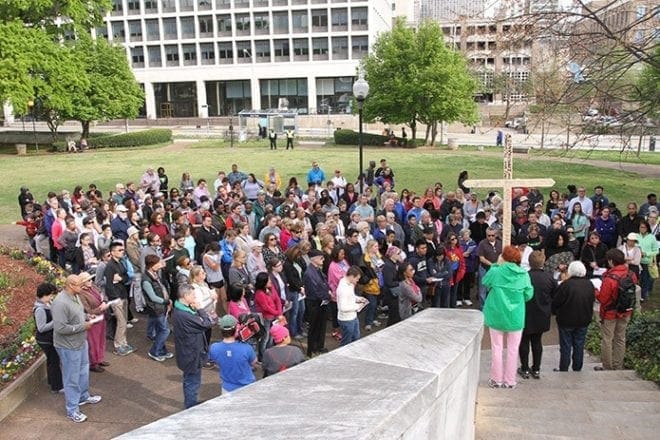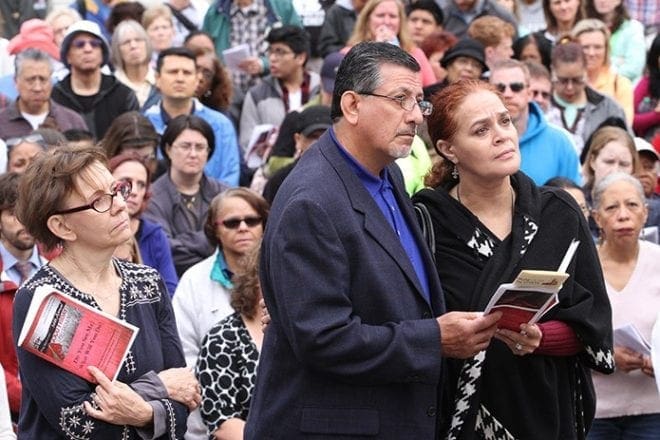Archbishop Wilton D. Gregory, center, carries the cross from the Shrine of the Immaculate Conception to the site of the second Station of the Cross (Jesus takes up his cross), Talmadge Park, during the 36th annual Good Friday Pilgrimage through downtown Atlanta. Walking beside the archbishop is Kat Doyle, right, director of Justice and Peace Ministries of the Atlanta Archdiocese. Photo By Michael Alexander
Atlanta
Praying at city sites, Good Friday pilgrims seek deeper concern for poor
By NICHOLE GOLDEN, Staff Writer | Published March 31, 2016
ATLANTA—More than 300 people walked a two-mile route along Atlanta’s busy city streets March 25 for the 36th annual Good Friday pilgrimage, an ecumenical journey from the Shrine of the Immaculate Conception to the Reflection Pool of the King Center.
The Archdiocese of Atlanta Justice and Peace Ministries sponsors the program of prayer and reflection, which began at 8:45 a.m.
Kat Doyle, ministries’ director, served as master of ceremonies and welcomed pilgrims to the commemoration of the Stations of the Cross.
“It is a tradition synonymous with Lent, Holy Week, and especially Good Friday, in which we remember the suffering Christ endured on the day he was crucified,” said Doyle. “Annually, people of many faiths join in this local pilgrimage as one human family to visit 14 urban sites and reflect upon Christ’s suffering with the most vulnerable among us today.”
The theme of pilgrimage was “Do You See Me? What Will You Do?”

A crowd of close to 200 people assembles in Hurt Park for the sixth Station of the Cross (Veronica wipes the face of Jesus) during the March 25 Good Friday pilgrimage. Photo By Michael Alexander
Doyle said the wooden cross for the ecumenical journey was also used to lead immigrant pilgrimages earlier in the week in Atlanta, Cartersville and Smyrna.
“It’s truly a symbol that we all follow the same cross. No matter our differences, we are all followers of Christ,” she said.
The stations served to remind pilgrims of those who suffer from homelessness, disease, poverty, hunger, and domestic violence as well as the problems that veterans, immigrants and refugees face.
The stations will help make pilgrims more aware of injustices, said Doyle.
“They also will ask us ‘what will we do now that we know?’ Because once we know, we can never un-know,” she added.
Some watch, some help carry the cross
Archbishop Wilton D. Gregory offered the opening prayer and reflection and Bishop Robert C. Wright, of the Episcopal Diocese of Atlanta, provided a closing reflection.
“If we had any particular doubt that we should come together in prayer on this Good Friday, we can release those doubts by simply thinking about Paris and San Bernardino, and now Brussels,” said Archbishop Gregory in reference to terrorist attacks.
The archbishop said pilgrims must also recall lives taken in the state of Georgia due to the death penalty and examine the presence of the immigrants who have come to the community in search of work, refuge, and the possibility of enriching family lives.

Michael and Dee Hidalgo, foreground right, of St. Francis of Assisi Church, Cartersville, listen to a reflection during the second Station of the Cross (Jesus takes up his cross) based on the theme of homelessness. Attending the 36th annual Good Friday pilgrimage was a first-time experience for the Hidalgos. Photo By Michael Alexander
“Those experiences tell us that Christ continues to suffer and be present in our world as he was present in the streets of Jerusalem as he walked to Calvary,” said Archbishop Gregory.
There were bystanders and watchers on the first Good Friday, but there were others like Simon of Cyrene who helped carry the cross.
“It was a spectacle kind of event, and it still is such an event for so many people,” said Archbishop Gregory. “Pope Francis has said that the greatest tragedy of our time is the lack of concern, the indifference that still fills the world.”
When we see someone standing at an interstate exit with a sign that reads “I’m hungry” or “Veteran without a job,” the tendency is to give a couple of bucks and move on, noted the archbishop.
“They become just faces, unless we probe more deeply to search their identity, to learn more about their stories,” he said.
One does not need to go to Jerusalem’s Via Dolorosa to learn about Jesus’ act of self-sacrificial love when there are thousands in Atlanta who need help with burdens, said the archbishop.
“Let us make it our mind and our intention to know more about the identity of those who carry their crosses each day,” he said.
“Don’t look away”
Archbishop Gregory carried the cross from the shrine altar outside to Talmadge Park, for the second station, “Jesus takes up his cross” where the prayer focus was homelessness and related issues of unemployment and substance abuse.
Joseph Barker II was the volunteer narrator at the second station portraying life as a homeless man.
“I’m not a bad guy, but I need help,” read Barker. “If you do nothing else, be kind.”
When you see someone living on the street, don’t look away, said Barker.
“Find out his name and talk to him. It might just save his life,” he said.
Other stops on the journey included the Fulton County Courthouse, Hurt Park, Big Bethel AME Church, and Our Lady of Lourdes Church.
At the midway point, pilgrims stopped for a water break at the Loudermilk Conference Center.
Cydney, Savannah and Kyle Wilson, sisters and parishioners of the Cathedral of Christ the King in Atlanta, joined friend Frances Wilbert for their first Good Friday pilgrimage.
Savannah Wilson, a student at the University of Mississippi, said the pilgrimage would definitely help them to look at others in a new way.
“It’s different than what I expected,” said Wilson about the Good Friday pilgrimage.
The girls each said they found the fourth station, “Jesus meets his mother,” very relatable to young people. The station featured a narrative read by Catholic Campaign for Human Development intern Katie Leduc about life as a runaway.
Following Leduc’s reading, the people prayed in unison, “Help us, Jesus, to see in Mary a reflection of the maternal side of God and to convey her healing, love and compassion to all those we encounter, especially those children who are lost and lonely.”
As they traveled from station to station, against the backdrop of distant sirens, the Good Friday pilgrims sang the refrain, “I will be, I will be, I will be strength for the journey.”
Visit www.archatl.com/ministries-services/justice-and-peace-ministries for more information about social justice programs in the Archdiocese of Atlanta.
These photos and others are available for purchase: https://gabull.smugmug.com/Events/Holy-Week-2016/